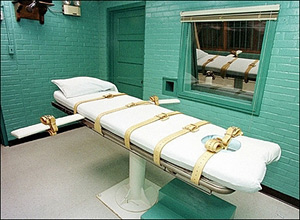 |
 |
 |
 News from Around the Americas | June 2006 News from Around the Americas | June 2006  
Mexican Serial Killer Executed in Texas
 AFP AFP


| | This photo taken in 2000 shows the "death chamber" at the Texas Department of Criminal Justice Huntsville Unit in Huntsville, Texas. A Mexican illegal immigrant convicted of brutally killing at least 15 people around the United States, most of them in Texas, was put to death, becoming the 23rd person to be executed in the United States this year. AFP/Paul Buck) |
A Mexican illegal immigrant convicted of brutally killing at least 15 people around the United States, most of them in Texas, was put to death, becoming the 23rd person to be executed in the United States this year.

"He was pronounced dead at 8:05 (0105 GMT Wednesday)," a state prison official told AFP in a telephone interview from the town of Huntsville, north of here.

The official said family members of both convict Angel Maturino Resendiz and his victims were watching the procedure from outside the execution chamber. Resendiz had declined a final meal.

The 46-year-old inmate known to many as "the railroad killer" was administered a lethal injection after the Supreme Court denied a last-ditch appeal by Resendiz lawyers, who had been trying to mount an insanity defense.

Mexico, meanwhile, had demanded clemency. Foreign Minister Luis Ernesto Derbez had written to Texas authorities, asking that Resendiz's life be spared. According to a statement issued by the Mexican government last week, Derbez argued that "mentally incapable people should not be subjected to capital punishment."

Resendiz, who committed most of his murders in the late 1990s, drifted around the country by freight train and carried out most of his crimes near railway tracks.

He used rocks and other heavy objects to bludgeon his victims to death, mainly in their homes, and then stole their money. Some of his female victims were raped.

The crimes that caused the most public outcry included the 1998 and 1999 killings of medical student Claudia Benton and church pastor Norman Sirnic in Texas.

Benton, a student at the Baylor College of Medicine, was raped, stabbed and bludgeoned repeatedly at her home in West University Place. Police found her jeep in San Antonio with Resendiz's fingerprints on the steering column.

Sirnic and his wife Karen Sirnic were bludgeoned to death with a sledgehammer in a parsonage of the United Church of Christ in Weimar.

Police found Resendiz in 1999 with the help of his sister Manuela, who feared her brother might kill more people or be killed himself.

She persuaded her brother to surrender to authorities voluntarily, a procedure that took place on an international bridge connecting El Paso, Texas, to Ciudad Juarez, Mexico.

As many as 60 people were executed in the United States last year -- 19 of them in Texas. Resendiz was the 13th convict to be put to death in Texas this year.

Mexican nationals make up a significant segment of US death row, with 52 of them currently awaiting execution in various penitentiaries.

Six Mexicans have been executed in the United States since 1976, when the Supreme Court reinstated the death penalty, each time triggering protests from the neighboring country. | 
 | |
 |



